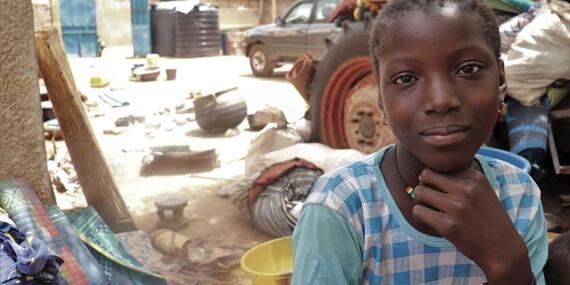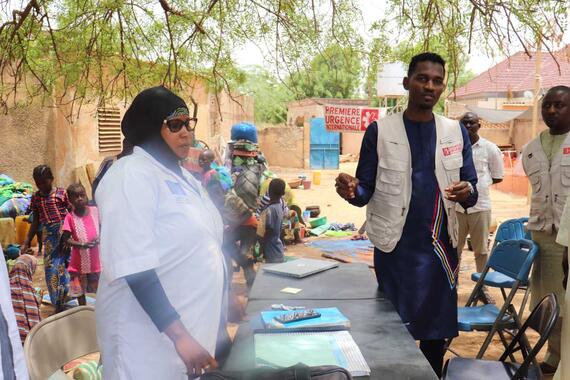Niger: “I am tired of asking for food and water”

by Laura Fultang
Boubacar Daoudou, 26, was displaced with his wife and two children following recurrent violent attacks by non-State armed groups (NSAGs) in Tassia village, in Niger’s Tillabéri Region.
His father and uncle were killed during the attacks, which triggered the family’s decision to flee and find refuge elsewhere. They longed for a sense of safety and security, a place where they could begin to heal and rebuild their shattered lives. They arrived in Gothèye village, where they have lived for about a year.
“When we arrived in Gothèye, the people from my village and my family received a warm welcome from the local authorities,” said Boubacar. “We were given food, clothes, water and household items. The sick received treatment, and a reception site was immediately set up with the capacity to accommodate more than 5,000 internally displaced people (IDPs).”
Boubacar is just one of more than 378,000 internally displaced people in Niger. The country is struggling due to a complex humanitarian crisis caused by conflict-related violence, socioeconomic challenges and the devastating effects of climate change. Humanitarian needs are increasing, while the resilience and coping strategies of the most vulnerable people are diminishing.
Boubacar explains: “Humanitarian actors are always ready to provide us with the necessary water, food, health, emergency shelter and protection that we need, but I am tired. I dream of a better future for my family. I am tired of asking for more food and water, not being able to work and earn my own money, waiting for assistance to take care of my wife, my son and infant daughter, and not being able to return to my village to see my friends and family members.”
He added: “I fear for the fate of my children’s education and well-being. Education is key to becoming a productive citizen.”
More than 50 per cent of children aged 7 to 16 are out of school in Niger due to conflicts. Nearly 900 schools are closed, affecting 77,000 children in the country’s Diffa, Maradi, Tahoua and Tillaberi Regions.
Boubacar has first-hand experience of how conflict affects education. He explains: “I dropped out of school because armed groups prohibited the running of mixed-gender schools in my village. Boys and girls were not allowed to attend the same school, in compliance with Islamic teachings. The NSAGs called such schools haram, which means ‘forbidden’ in Islam.”
After dropping out of school against his will, Boubacar became a local retailer and sold household items, such as sugar, coffee and soap, to earn a living. But he now longs for an opportunity to work again and take care of his family.
“I am an unemployed person, against my will. My greatest desire would be to return to my native village, where I could work, build my house and contribute to the local economy. I know this is not possible now due to persisting insecurity, so I am calling on the Government and its partners to give us job opportunities, which would enable us to rebuild our lives in Gothèye,” he said.
A plea for durable solutions
The global number of IDPs has reached an all-time high, but the traditional approach to meeting their immediate humanitarian needs is now inefficient due to the protracted nature of today’s crises.
A major humanitarian challenge is ensuring IDPs are not left behind during response efforts. This would contradict the promise of the Sustainable Development Goals that the most vulnerable members of the population, including IDPs, must be empowered to contribute to and benefit from development efforts.
Protracted internal displacement not only affects IDPs but also host communities and local governments, who are often overwhelmed by the influx of IDPs and by the additional pressure on already scarce basic social services, such as schools, water and health care.

To show its commitment to early recovery and initiatives to rebuild the livelihoods of IDPs and returnees, the Government of Niger invited Professor Walter Kälin, an expert on displacement issues and durable solutions, to support the set-up of a durable solutions strategy for Niger, in collaboration with the Durable Solutions Working Group in Niger, set up by the Government.
Earlier this year, Professor Kälin visited Niger for the second time, on the Government’s request, and met with national authorities, and humanitarian and development partners to help set up a national durable solutions strategy.
He emphasized the elements crucial to ensure durable solutions, including security and freedom of movement, access to basic social services, employment opportunities, participation in political affairs and access to the legal system.
In 2012, Niger was among the first 15 countries to ratify the Kampala Convention (formally the African Union Convention for the Protection and Assistance of Internally Displaced Persons in Africa). Following this ratification, in 2018 Niger's National Assembly unanimously voted to adopt national law 2018/74 on the protection of and assistance to IDPs. This set Niger on the path to ensuring effective humanitarian and durable solutions for IDPs nationwide.
During the ceremonies to celebrate Concord Day, which commemorates the national peace agreement signed on 24 April 1995 to end an internal rebellion, Mr. Hamadou Adamou Souley, Niger’s Minister of Interior and Decentralization, said: “I would now like to reassure young people that the Act III Renaissance Programme offers them opportunities for integration and participation in national construction. Indeed, it reserves a place of choice for them because its credo is that no citizen should be left behind.”
The national programme emphasizes a participatory and inclusive approach that enables the most vulnerable people, including youth, women, older people and people with disabilities, to define their own priorities, take ownership of the process and contribute to the sustainability of selected actions.
The number of people who need humanitarian assistance in Niger increased from 1.9 million in 2017 to 4.3 million (or 15 per cent of the population) in 2023. Violence by armed actors in Niger and surrounding areas in Burkina Faso, Mali and Nigeria has led to severe protection issues.
To provide emergency assistance to the most vulnerable people, Niger’s 2023 Humanitarian Response Plan is seeking US$584 million to respond to the needs of 2.7 million people.
